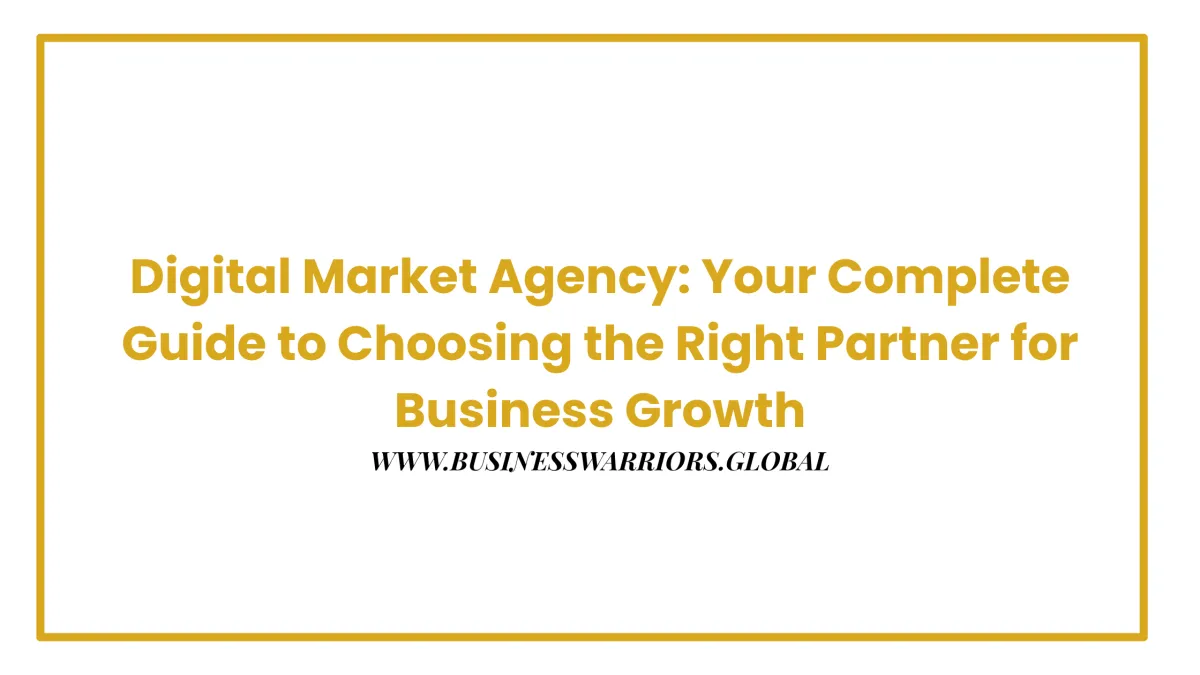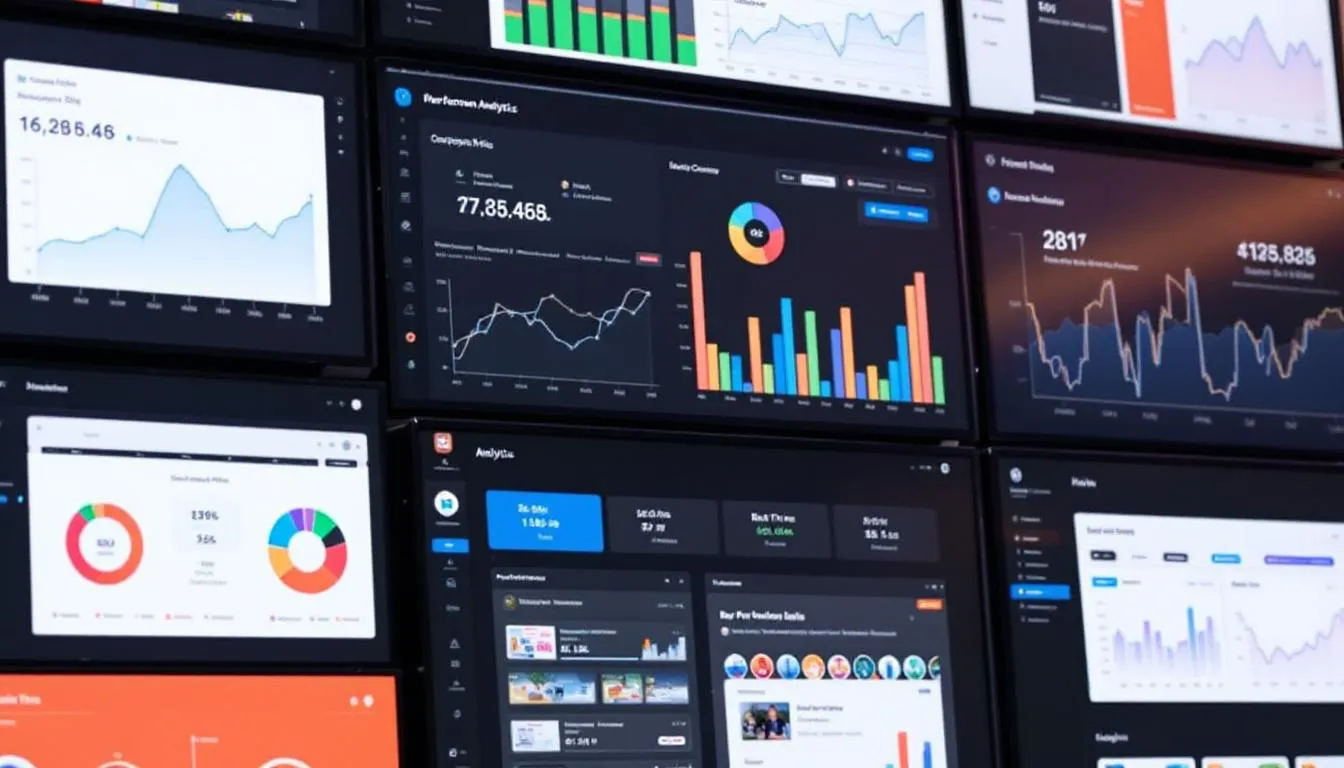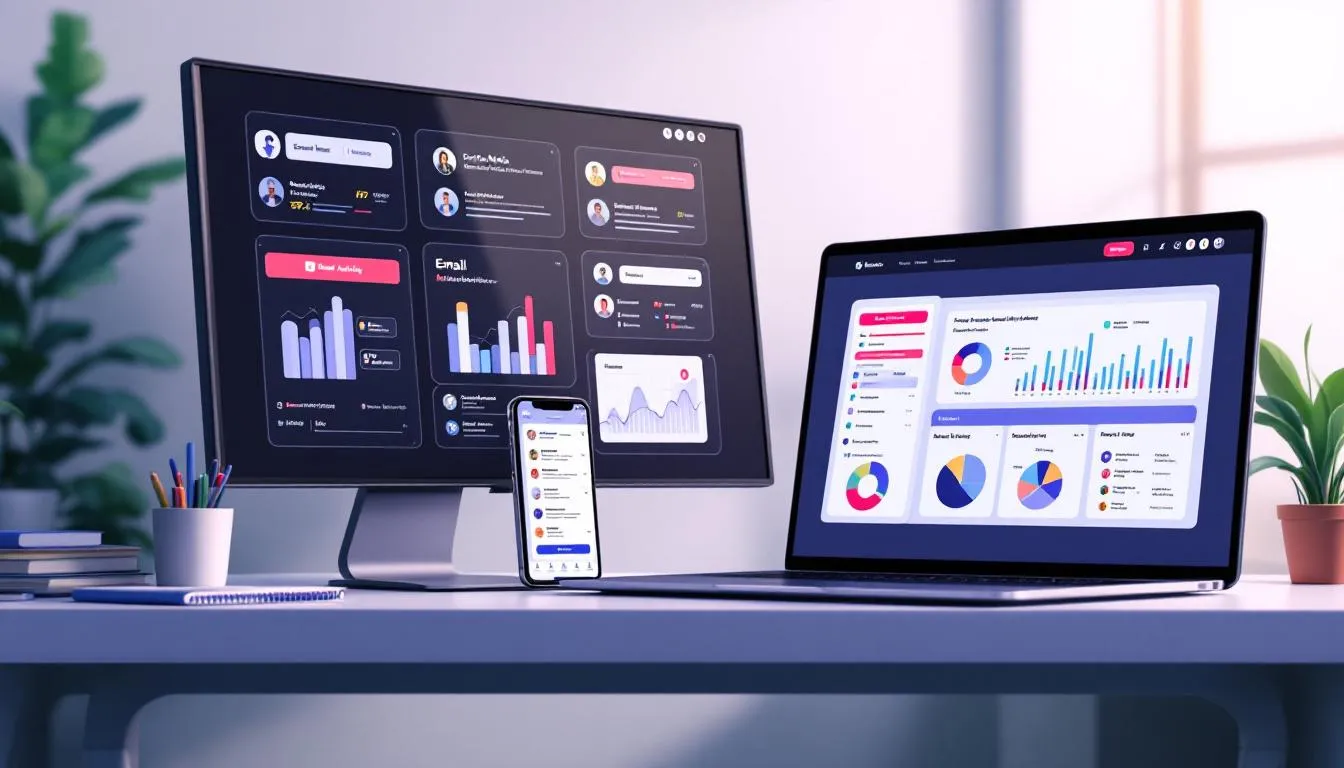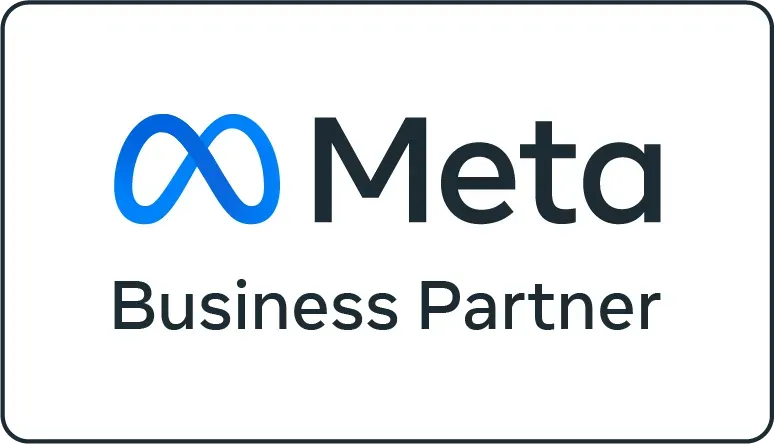
Digital Market Agency: Your Complete Guide to Choosing the Right Partner for Business Growth
Key Takeaways
Digital marketing agencies provide comprehensive online marketing services including SEO, PPC, social media management, and content creation to drive business growth
Partnering with a specialized agency offers access to expert knowledge, advanced tools, and proven strategies that deliver measurable ROI
Successful agencies focus on multi-channel approaches, data-driven decision making, and transparent reporting to maximize campaign performance
When selecting an agency, prioritize those offering customized strategies, clear communication, and demonstrated results in your industry
The right digital marketing partnership can significantly increase lead generation, brand visibility, and revenue growth within 90 days
In today’s digital-first marketplace, over 60% of marketing budgets are now allocated to digital channels rather than traditional advertising. The global digital marketing services industry has exploded to over $320 billion in 2023, with projections reaching $670 billion by 2028. This massive growth reflects a fundamental shift in how businesses connect with their target audience and drive business growth.
For companies navigating this complex digital landscape, partnering with the right digital marketing agency has become essential for success. Whether you’re a startup looking to establish your digital presence or an established business seeking to optimize your digital marketing efforts, understanding how to choose and work with a digital marketing company can be the difference between stagnant growth and explosive success. Digital marketing agencies help improve a business's online presence by leveraging strategies like SEO, social media, and content marketing to boost visibility, reach, and engagement across digital platforms.
This comprehensive guide will walk you through everything you need to know about digital marketing agencies, from understanding their core services to selecting the best digital marketing agency for your specific business objectives.

What is a Digital Marketing Agency?
A digital marketing agency is a specialized organization that focuses on planning, creating, executing, and optimizing digital marketing campaigns for businesses across various online platforms and digital marketing channels. These agencies serve as strategic partners, helping companies navigate the complex world of digital marketing to achieve their business goals and drive sustainable growth.
A digital agency provides integrated digital services, including web development, branding, and digital marketing campaigns, supporting businesses across multiple industries.
Evolution from Traditional to Digital
The modern digital marketing agency emerged alongside the rise of the internet in the late 1990s and early 2000s. Initially, these agencies focused primarily on building websites and creating simple online advertisements. However, as the digital ecosystem evolved with the advent of search engines, social media platforms, mobile applications, and sophisticated advertising technologies, agencies transformed into multifaceted, tech-driven entities.
The primary distinction between digital marketing agencies and traditional marketing agencies lies in their approach to measurement and optimization. While traditional agencies often relied on broad demographic targeting and delayed results, digital agencies focus on real-time, data-driven results such as website traffic, lead generation, and immediate sales conversions. Unlike other agencies that may use outdated or less effective methods, digital agencies leverage data-driven and creative strategies to deliver superior performance and measurable outcomes.
Role in Modern Business
Today’s leading digital marketing agency serves as a bridge between businesses and their target audience across multiple online channels. A digital marketing agency plays a crucial role in building and managing a business's online presence through strategies such as SEO, social media, content marketing, and website design. They understand that successful digital marketing requires a deep understanding of consumer behavior, search engine algorithms, social media dynamics, and emerging industry trends.
These agencies help businesses establish and enhance their business’s online presence through integrated strategies that combine organic and paid approaches. From improving search engine rankings to managing social media accounts, a comprehensive digital marketing agency provides the expertise needed to compete effectively in the digital marketplace.
Types of Digital Marketing Agencies
Digital marketing agencies typically fall into two main categories:
Full-service agencies handle all major digital marketing channels and often integrate with traditional media for unified marketing strategies. These agencies cater to clients needing comprehensive, multi-channel campaigns and typically work with larger budgets while delivering economies of scale and strategic consistency.
Niche or boutique agencies focus on specific services such as seo services, social media marketing, or performance marketing. They often serve smaller businesses or specialized industries, offering deeper expertise and more personalized service at competitive price points.
Understanding the Customer Journey
The customer journey is at the heart of every successful digital marketing strategy. It encompasses the entire process a customer goes through when interacting with your brand, from the first moment of awareness to the final conversion and beyond. A leading digital marketing agency understands that each stage of the customer journey requires a unique approach and carefully crafted digital marketing campaigns to guide prospects toward your business objectives.
To effectively map the customer journey, digital marketing specialists analyze how potential customers discover your brand—often through search engine optimisation (SEO) that boosts your visibility on search engine results pages. As customers move from awareness to consideration, social media marketing plays a crucial role in building engagement and trust, while paid advertising such as Google Ads can drive targeted traffic and encourage conversions at the decision stage.
By developing a comprehensive marketing strategy that addresses every touchpoint, a digital marketing agency ensures that your business is present and persuasive at each step. This approach not only increases website traffic but also helps drive business growth by converting prospects into loyal customers. Ultimately, understanding and optimizing the customer journey allows businesses to align their digital marketing efforts with their business objectives, resulting in more effective campaigns and measurable results.
Core Digital Marketing Services
The foundation of any successful digital marketing company lies in its ability to deliver integrated services across multiple digital marketing channels. A well-structured marketing plan is essential for coordinating content creation, website promotion, and overall digital marketing efforts, ensuring long-term success. Understanding these key services helps businesses identify which agencies align best with their marketing strategy, business objectives, and goals such as generating leads.
Search Engine Optimization (SEO)
Search engine optimisation forms the backbone of organic online visibility. Professional seo services involve comprehensive keyword research, technical site auditing, content optimization, and strategic link building to improve rankings on search engine results pages. A competent seo agency employs both on-page and off-page strategies to ensure sustainable growth in organic search traffic.
The process typically includes analyzing your industry’s competitive landscape, identifying high-value keywords your target audience searches for, and implementing technical improvements to help search engines better understand and rank your content. Most agencies report that SEO provides an average ROI of 122% per campaign, making it one of the most cost-effective digital marketing solutions.
Pay-Per-Click (PPC) Advertising
PPC campaigns, particularly google ads, provide immediate visibility and traffic to businesses willing to invest in paid advertising. Performance marketing agencies excel at creating targeted campaigns that deliver measurable results through platforms like Google Ads, Microsoft Bing, and social media advertising networks. A performance marketing agency prioritizes measurable results and a performance-driven approach, focusing on driving revenue and profit through full-funnel tactics.
Effective PPC management involves continuous optimization of ad copy, landing pages, audience targeting, and bid strategies. The average business generates $2 for every $1 spent on paid search, though results vary significantly based on industry competition and campaign quality.
Social Media Marketing
Professional social media management encompasses strategy development, content creation, community management, and social media advertising across platforms like Facebook, Instagram, LinkedIn, and TikTok. Agencies help businesses build their social media presence while managing social media accounts to drive engagement and conversions.
This service includes developing creative content that resonates with your target audience, scheduling posts for optimal engagement, responding to comments and messages, and running targeted social media ads to expand reach and generate leads.
Content Marketing
A comprehensive content marketing campaign involves creating valuable, relevant content that attracts and engages your target audience throughout their customer journey. This includes blog posts, videos, infographics, whitepapers, and email marketing campaigns designed to educate prospects and move them toward conversion.
Successful content marketing requires understanding your audience’s pain points, creating content that addresses their needs, and distributing it across appropriate online platforms to maximize visibility and engagement.
Website Development and Optimization
Modern digital marketing agencies often provide website development services that focus on conversion rate optimisation and user experience improvements. This includes creating responsive, fast-loading websites optimized for both search engines and user engagement.

Specialized Services
Beyond core services, many agencies offer specialized solutions including:
Marketing automation helps businesses nurture leads through automated email sequences, personalized content delivery, and customer relationship management integration.
Conversion rate optimisation focuses on improving website performance by testing different elements to increase the percentage of visitors who complete desired actions.
Influencer marketing leverages partnerships with social media influencers to expand brand reach and credibility within specific target markets, and often complements the efforts of content marketing agencies in crafting and distributing compelling branded messages.
Local SEO optimizes businesses for location-based searches, particularly important for companies serving specific geographic areas.
Creative Content in Digital Marketing
Creative content is the engine that powers effective digital marketing campaigns. It includes everything from engaging videos and insightful blog posts to eye-catching social media updates and compelling email marketing messages. The best digital marketing agency employs a team of digital marketing specialists who excel at crafting creative content that resonates with your target audience and supports your overall marketing strategy.
A successful content marketing campaign leverages a mix of digital channels—such as social media platforms, email marketing, and your website—to reach and engage potential customers at every stage of the customer journey. By tailoring creative content to address the specific needs and interests of your audience, businesses can build brand awareness, foster trust, and encourage meaningful interactions that lead to conversions.
Performance marketing is also a key component, ensuring that every piece of content is designed with measurable results in mind. Digital marketing agencies use data-driven insights to refine their content marketing strategies, focusing on what works best to achieve your business objectives. By integrating creative content with effective marketing strategies, businesses can generate leads, drive engagement, and achieve sustainable growth in a competitive digital landscape.
Benefits of Working with a Digital Marketing Agency
Partnering with a digital marketing agency offers numerous advantages over attempting to manage digital marketing efforts in-house or working with multiple freelancers. Understanding these benefits helps businesses make informed decisions about their marketing strategy.
Clients benefit from the agency's expertise, resources, and strategic approach, which provide a competitive advantage and drive business growth.
Access to Specialized Expertise
Digital marketing specialists bring years of experience and industry certifications from platforms like Google, Facebook, and HubSpot. This expertise spans multiple disciplines that would be expensive and time-consuming to develop internally. A leading digital marketing agency employs teams of specialists who stay current with algorithm changes, platform updates, and emerging best practices.
The average agency team includes SEO experts, PPC specialists, content creators, social media strategists, web developers, and analytics professionals. This collective knowledge ensures that campaigns deliver measurable results across all digital marketing channels.
Cost-Effective Resource Allocation
Hiring an in house team with equivalent skills would typically cost significantly more than partnering with an agency. Consider that a single experienced digital marketing expert commands $60,000-$100,000 annually, while a comprehensive team might cost $300,000-$500,000 per year before considering benefits, training, and tool expenses.
Most digital marketing agencies offer flexible pricing models that allow businesses to access enterprise-level tools and expertise at a fraction of the cost of building internal capabilities. This approach allows companies to allocate resources more efficiently while maintaining focus on core business operations.
Proven Strategies and Track Record
Established agencies bring a strong track record of successful campaigns across various industries. They understand which marketing strategies work for different business types and can adapt proven approaches to your specific situation. Agencies often provide examples of previous campaigns to demonstrate their transparency and experience with similar projects. This experience translates to faster results and reduced risk of costly mistakes.
Agencies typically maintain detailed case studies and client testimonials that demonstrate their ability to drive business growth. They’ve navigated challenges across different market conditions and can apply these lessons to optimize your campaigns from day one.
Advanced Tools and Technology
Professional digital marketing agencies invest heavily in premium tools for analytics, automation, content creation, and campaign management. These tools often cost thousands of dollars monthly and require specialized training to use effectively.
By partnering with an agency, businesses gain access to sophisticated marketing automation platforms, advanced analytics tools, premium design software, and enterprise-level reporting capabilities that would be prohibitively expensive to license independently.
Scalability and Flexibility
As your business grows, a quality digital marketing agency can scale their services to match your expanding needs. Whether you’re launching new products, entering new markets, or increasing your marketing budget, agencies can quickly adjust their approach and allocate additional resources.
This scalability extends to seasonal fluctuations, product launches, and special campaigns that require temporary increases in marketing intensity. Rather than hiring and training additional staff, you can leverage your agency’s existing capabilities to handle peak demand periods.

How to Choose the Right Digital Marketing Agency
Selecting the best digital marketing agency for your business requires careful evaluation of multiple factors. The right partnership can transform your online presence and drive significant business growth, while the wrong choice can waste resources and delay progress.
Working with experienced marketing strategists ensures you benefit from effective marketing blueprints tailored to your business needs.
Evaluate Portfolio and Case Studies
Begin your selection process by thoroughly reviewing each agency’s portfolio and case studies. Look for examples of work with businesses similar to yours in size, industry, or target market. Strong agencies showcase specific results including traffic increases, lead generation improvements, and revenue growth.
Pay attention to the diversity of industries represented in their portfolio. While industry expertise is valuable, agencies that work across multiple sectors often bring fresh perspectives and cross-industry insights that can benefit your campaigns.
Assess Industry Experience and Client Testimonials
Client testimonials provide valuable insights into an agency’s working style, communication practices, and ability to deliver results. Look for testimonials that mention specific outcomes rather than generic praise. Strong testimonials often include metrics like “increased organic traffic by 150%” or “generated 200% more qualified leads.”
Consider reaching out to past or current clients if possible. Many businesses are willing to share their experiences with agencies, providing unfiltered insights into the partnership’s strengths and challenges.
Review Service Offerings
Ensure the agency’s key services align with your current needs and long-term goals. If your primary focus is lead generation, prioritize agencies with strong track records in SEO, PPC, and conversion rate optimisation. For brand awareness goals, look for agencies excelling in social media marketing and content creation.
Consider whether you prefer working with a full-service agency that can handle all aspects of your digital marketing strategy or specialized agencies that excel in specific areas. Full-service agencies offer convenience and integrated strategies, while specialists may provide deeper expertise in critical areas.
Communication Style and Reporting
Effective communication forms the foundation of successful agency partnerships. During initial consultations, evaluate how well the agency explains complex digital marketing concepts in terms you understand. They should avoid excessive digital marketing speak and focus on how their services achieve your business objectives.
Discuss reporting frequency and format preferences. Quality agencies provide transparent reporting with clear explanations of campaign progress, performance metrics, and optimization strategies. They should be willing to share access to analytics platforms and provide regular updates on campaign performance.
Pricing Models and Value
Digital marketing agency pricing varies significantly based on services, scope, and results. Common models include monthly retainers, project-based pricing, and performance-based fees. Evaluate which model aligns best with your budget and risk tolerance.
Be wary of agencies offering prices significantly below market rates, as this often indicates limited experience, offshore teams, or corners being cut in service delivery. Conversely, the most expensive option isn’t always the best value. Focus on agencies that demonstrate clear ROI potential and have transparent pricing structures.
Red Flags to Avoid
Several warning signs indicate agencies you should avoid:
Unrealistic promises such as “guaranteed first-page rankings” or “overnight success” suggest the agency doesn’t understand how digital marketing actually works. Legitimate agencies focus on sustainable growth and realistic timelines.
Lack of transparency in reporting or unwillingness to provide access to campaign data suggests the agency may be hiding poor performance or using questionable tactics.
Cookie-cutter approaches without customization for your specific business indicate the agency treats all clients identically rather than developing tailored digital marketing strategies.
Poor communication during the consultation process often reflects ongoing communication challenges throughout the partnership.
Success Factors for Digital Marketing Partnerships
Successful partnerships between businesses and digital marketing agencies require more than just selecting the right agency. Establishing clear expectations, maintaining open communication, and fostering collaborative relationships significantly impact campaign outcomes.
Clear Goal Setting and KPIs
Begin every partnership by establishing specific, measurable business goals. Rather than vague objectives like “increase online presence,” define concrete targets such as “generate 100 qualified leads monthly” or “increase e-commerce revenue by 25% within six months.”
Work with your agency to identify the most relevant key performance indicators (KPIs) for tracking progress. These might include website traffic growth, cost per lead, conversion rates, customer lifetime value, or return on advertising spend (ROAS). Clear metrics enable both parties to evaluate success objectively and make data-driven optimizations.
Regular Communication and Collaboration
Establish regular communication schedules with weekly reports and monthly strategy reviews. This consistent contact ensures alignment between your business objectives and the agency’s tactical execution. Many successful partnerships include quarterly business reviews to assess overall progress and adjust strategies based on market changes or business evolution.
Encourage collaboration between your internal team and the agency’s digital marketing experts. Your team’s industry knowledge combined with the agency’s marketing expertise often produces the most effective campaigns. Share insights about customer behavior, seasonal trends, and competitive dynamics that can inform campaign optimization.
Continuous Optimization and Testing
The most successful digital marketing campaigns continuously evolve based on performance data and market changes. Work with agencies that prioritize A/B testing, performance analysis, and iterative improvements rather than “set and forget” approaches.
This optimization mindset applies to all digital marketing channels, from testing different ad copy in google ads campaigns to experimenting with content formats for social media platforms. Agencies should regularly present optimization opportunities and explain how proposed changes will improve campaign performance.
Long-term Commitment and Patience
Digital marketing success requires time to develop and mature. While paid advertising can generate immediate traffic, sustainable growth through SEO, content marketing, and brand building typically requires 3-6 months to show significant results.
Successful businesses commit to long-term partnerships that allow strategies to develop and compound over time. This patience enables agencies to implement comprehensive approaches rather than focusing solely on quick wins that may not support long-term business growth.

Industry Trends and Future Outlook
The digital marketing landscape continues evolving rapidly, driven by technological advances, changing consumer behavior, and regulatory developments. Understanding current industry trends helps businesses and agencies adapt their strategies for continued success.
Artificial Intelligence and Machine Learning
AI and machine learning technologies are revolutionizing digital marketing through enhanced personalization, predictive analytics, and automated optimization. Leading agencies now use AI for audience modeling, ad creative generation, and campaign optimization that was previously impossible with manual approaches.
These technologies enable more sophisticated customer journey mapping and dynamic content delivery that adapts to individual user behavior in real-time. Agencies investing in AI capabilities can deliver more effective campaigns while reducing manual optimization time.
First-Party Data and Privacy Regulations
Growing privacy regulations like GDPR and the phasing out of third-party cookies are reshaping digital marketing strategies. Agencies are helping clients develop first-party data collection strategies through email marketing, customer surveys, and direct engagement initiatives.
This shift emphasizes the importance of building owned audiences through email lists, social media followers, and direct customer relationships. Agencies that excel at helping clients develop these owned assets will provide increasing value as privacy regulations expand.
Video Content and Interactive Experiences
Video content continues dominating digital marketing across all platforms. From short-form videos on TikTok and Instagram to long-form educational content on YouTube, agencies are investing heavily in video production capabilities and strategies.
Interactive content including polls, quizzes, augmented reality experiences, and live streaming events are becoming standard components of comprehensive digital marketing strategies. These formats drive higher engagement rates and provide valuable data about customer preferences.
Voice Search and Smart Device Optimization
The proliferation of smart speakers and voice assistants is changing how people search for information and interact with brands. Agencies are adapting SEO strategies to account for conversational search queries and developing voice-specific content strategies.
This trend extends beyond search to include voice-activated shopping, smart home integration, and audio content marketing through podcasts and smart speaker skills.
Measuring Digital Marketing Agency Performance
Effective measurement and reporting systems enable businesses to evaluate their agency partnerships objectively and ensure continued alignment with business objectives. Understanding which metrics matter most helps maximize the value of your digital marketing investment.
Website Traffic and Engagement Metrics
Monitor both the quantity and quality of website traffic generated through various digital marketing channels. Key metrics include organic search traffic growth, direct traffic increases, referral traffic from social media platforms, and paid traffic from advertising campaigns.
Beyond basic traffic volume, evaluate engagement metrics such as time on site, pages per session, and bounce rates. These indicators reveal whether the traffic your agency generates consists of genuinely interested prospects or simply casual browsers.
Lead Generation and Conversion Metrics
Track lead generation performance across all marketing channels to understand which activities drive the highest quality prospects. Monitor metrics including cost per lead, lead-to-customer conversion rates, and lead quality scores based on predefined criteria.
Conversion rate optimisation efforts should show measurable improvements in key conversion metrics over time. Whether your primary conversions are sales, form submissions, or phone calls, agencies should demonstrate consistent improvement in conversion rates and overall conversion volume.
Revenue Attribution and ROI Calculations
The most important agency performance metrics relate directly to revenue impact. Track revenue attribution across different marketing channels to understand which activities drive actual business growth rather than just vanity metrics.
Calculate return on advertising spend (ROAS) for paid campaigns and overall marketing ROI for integrated campaigns. Successful agencies typically deliver 3:1 to 5:1 ROI ratios, though this varies significantly by industry and business model.
Brand Awareness and Social Media Metrics
For businesses focused on brand building, monitor awareness campaigns through social media reach, engagement rates, share of voice compared to competitors, and brand mention tracking across online platforms.
Social media presence improvements should include follower growth, engagement rate increases, and meaningful interactions that indicate genuine community building rather than simple follower accumulation.
Customer Lifetime Value and Retention
Evaluate how agency efforts impact customer lifetime value and retention rates. Effective digital marketing campaigns should attract higher-quality customers who remain engaged with your brand longer and generate more revenue over time.
This long-term perspective helps distinguish between agencies that focus on immediate sales versus those building sustainable customer relationships that support ongoing business growth.

Frequently Asked Questions
How much should I budget for digital marketing agency services?
Most businesses allocate 7-12% of their total revenue to marketing, with digital representing 50-70% of that budget. Small businesses typically invest $3,000-$10,000 monthly, while larger enterprises may spend $20,000+ depending on goals and industry competition. The key is ensuring your investment can generate positive ROI - if an agency can demonstrate they’ll generate $5 in revenue for every $1 spent, higher budgets become easier to justify. Start with what you can afford and scale up as you see results.
How long does it take to see results from digital marketing efforts?
PPC campaigns can show immediate traffic within days, while SEO typically takes 3-6 months for significant results. Social media growth varies but generally shows engagement improvements within 30-60 days. Most agencies recommend a minimum 6-month commitment for comprehensive strategy implementation. Content marketing and brand building efforts may take even longer to show full impact. Be wary of agencies promising overnight success - sustainable digital marketing growth requires time and consistent effort.
Can I maintain control over my marketing accounts when working with an agency?
Reputable agencies allow clients to retain ownership of all digital assets including Google Ads accounts, social media profiles, and analytics access. This ensures transparency and protects your data if you decide to switch agencies or bring marketing in-house. Always clarify ownership terms before signing contracts and ensure you have admin access to all platforms. If an agency refuses to provide access or wants to maintain control of your accounts, consider this a major red flag.
What’s the difference between hiring a freelancer versus a digital marketing agency?
Agencies offer comprehensive teams with specialized skills, proven processes, and account management support, while freelancers typically focus on specific services. Agencies provide better scalability, reliability, and strategic oversight, though freelancers may be more cost-effective for limited-scope projects. Agencies also offer continuity - if one team member leaves, others can maintain your campaigns. However, freelancers often provide more personalized attention and flexibility for smaller budgets or specialized needs.
How do digital marketing agencies stay current with platform algorithm changes?
Professional agencies invest in ongoing education, maintain platform partnerships, attend industry conferences, and participate in beta testing programs. They also use advanced analytics tools and A/B testing to quickly adapt strategies when algorithm updates impact campaign performance. Leading agencies often have team members with official certifications from Google, Facebook, and other platforms, ensuring they receive updates and training on new features before they become widely available. This expertise is one of the key advantages of working with an established agency versus managing marketing in-house.
Conclusion
In conclusion, selecting the right digital marketing agency is a pivotal decision for any business aiming to drive growth and achieve its business objectives. A leading digital marketing agency brings a strong track record, a team of skilled digital marketing specialists, and a comprehensive suite of digital marketing services—including SEO, social media marketing, and paid advertising—to the table. By understanding the customer journey and crafting tailored digital marketing campaigns, the right digital marketing agency can help your business increase website traffic, generate high-quality leads, and reach your business goals.
When evaluating potential partners, look for an agency that offers transparent reporting, a tailored digital marketing strategy, and a commitment to performance marketing. These qualities ensure that your marketing efforts are aligned with your objectives and deliver measurable results. With the support of a trusted digital marketing agency, your business can unlock the full potential of digital marketing, achieving sustainable growth and a competitive edge for over a decade and beyond.
Aligning Digital Marketing with Business Goals
In today’s fast-paced digital landscape, aligning your digital marketing strategy with your business goals is not just a best practice—it’s a necessity for driving sustainable business growth and maximizing return on investment. A tailored digital marketing strategy ensures that every campaign, from social media marketing to paid search, is purpose-built to support your unique business objectives and deliver measurable results.
The process begins with a deep understanding of your business’s online presence, including your website, social media accounts, and current search engine rankings. A leading digital marketing agency will conduct a thorough audit to identify strengths, weaknesses, and opportunities across all digital marketing channels. This foundational step allows the agency to craft a marketing plan that targets your ideal audience, leverages the most effective digital marketing services, and aligns with your overall business objectives.
Choosing the right digital marketing agency is critical. Look for a partner with a strong track record, proven expertise in your industry, and the ability to deliver key services such as SEO services, content marketing, social media management, and paid advertising. The best digital marketing agency will work closely with you to develop a customized marketing strategy that not only increases website traffic but also enhances your social media presence, improves search engine optimisation, and drives lead generation.
Transparent reporting and ongoing campaign performance analysis are essential components of a successful partnership. Your agency should provide clear, actionable insights into how your digital marketing efforts are performing against established KPIs—such as website traffic, conversion rates, lead generation, and ROI. This data-driven approach enables continuous optimization, ensuring your digital marketing campaigns remain aligned with your evolving business goals and industry trends.
The benefits of aligning digital marketing with business objectives are significant. Businesses that invest in a tailored digital marketing strategy see increased online visibility, higher search engine rankings, improved engagement on social media platforms, and more qualified leads entering the sales funnel. By focusing on the customer journey and delivering relevant, creative content across multiple online platforms, you can enhance brand awareness, build trust, and drive conversions.
To achieve these outcomes, it’s important to leverage a mix of digital marketing channels—including search engines, social media platforms, email marketing, and paid advertising. Each channel plays a unique role in reaching your target audience and supporting your overall marketing strategy. For example, SEO drives organic traffic and long-term visibility, while social media advertising and Google Ads can generate immediate results and boost brand awareness.
Measuring success requires tracking key performance indicators such as website traffic, social media engagement, lead generation, conversion rates, and customer lifetime value. By regularly reviewing these metrics and collaborating with your digital marketing agency, you can refine your marketing plan, capitalize on emerging industry trends, and ensure your digital marketing efforts are always working toward your business objectives.
As the digital landscape continues to evolve, staying ahead of industry trends—such as artificial intelligence, video marketing, and personalization—will be crucial for maintaining a competitive edge. Partnering with a digital marketing agency that prioritizes innovation and continuous learning ensures your business is well-positioned to adapt and thrive.
In summary, aligning digital marketing with business goals is the cornerstone of effective marketing strategies and long-term business growth. By working with a leading digital marketing agency to develop a tailored digital marketing strategy, you can unlock new opportunities, drive measurable results, and achieve your business objectives in an ever-changing digital world.




